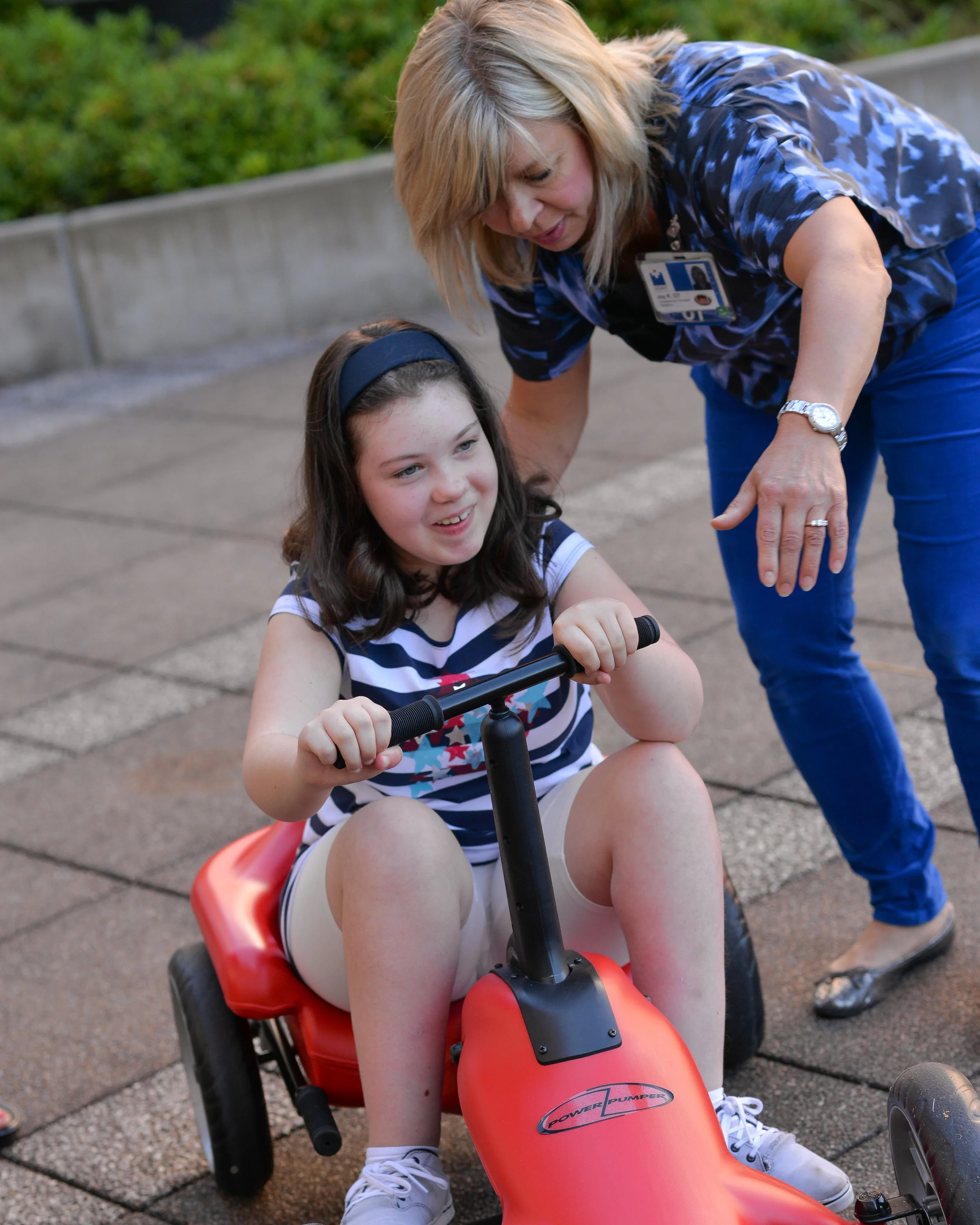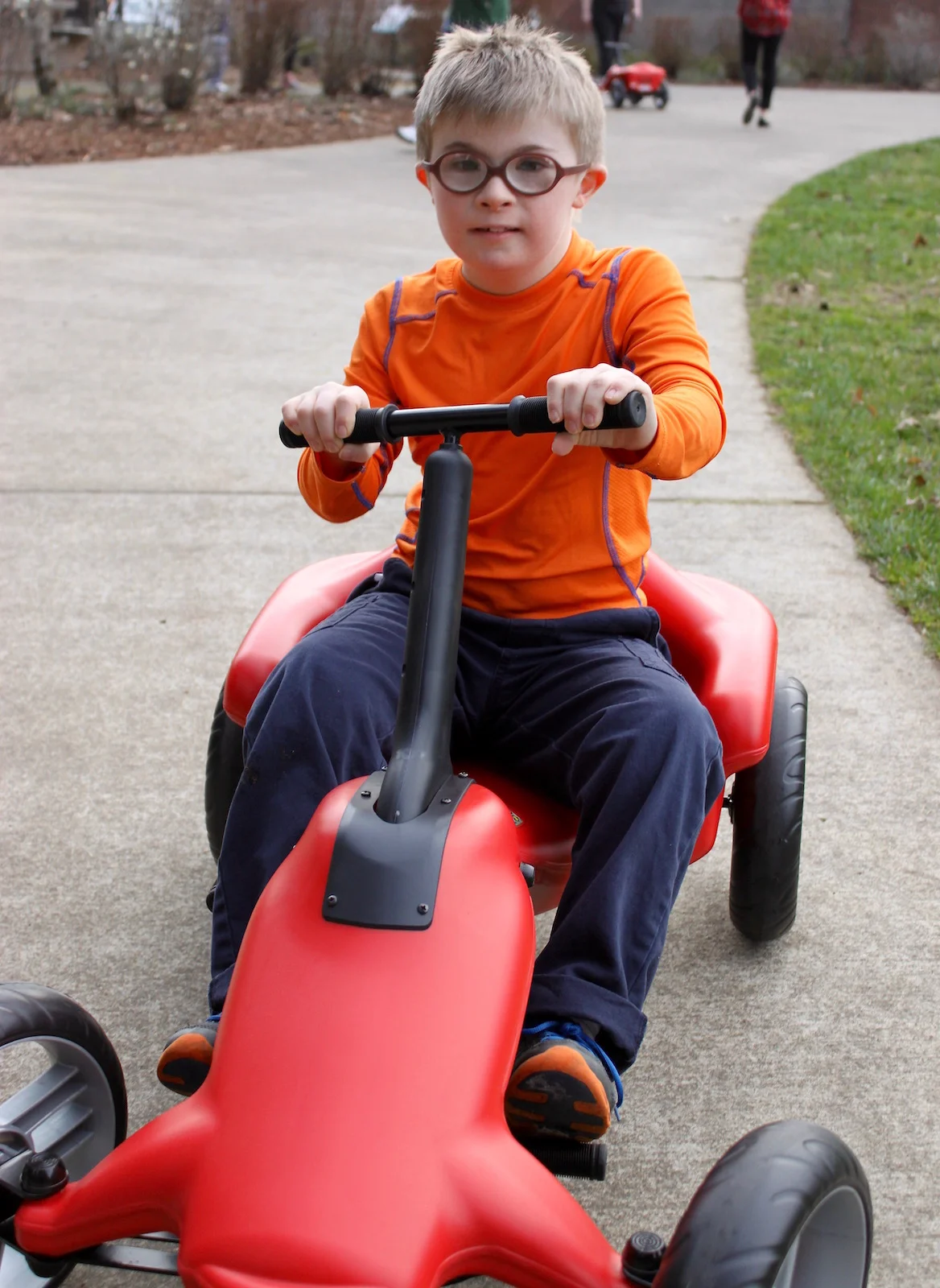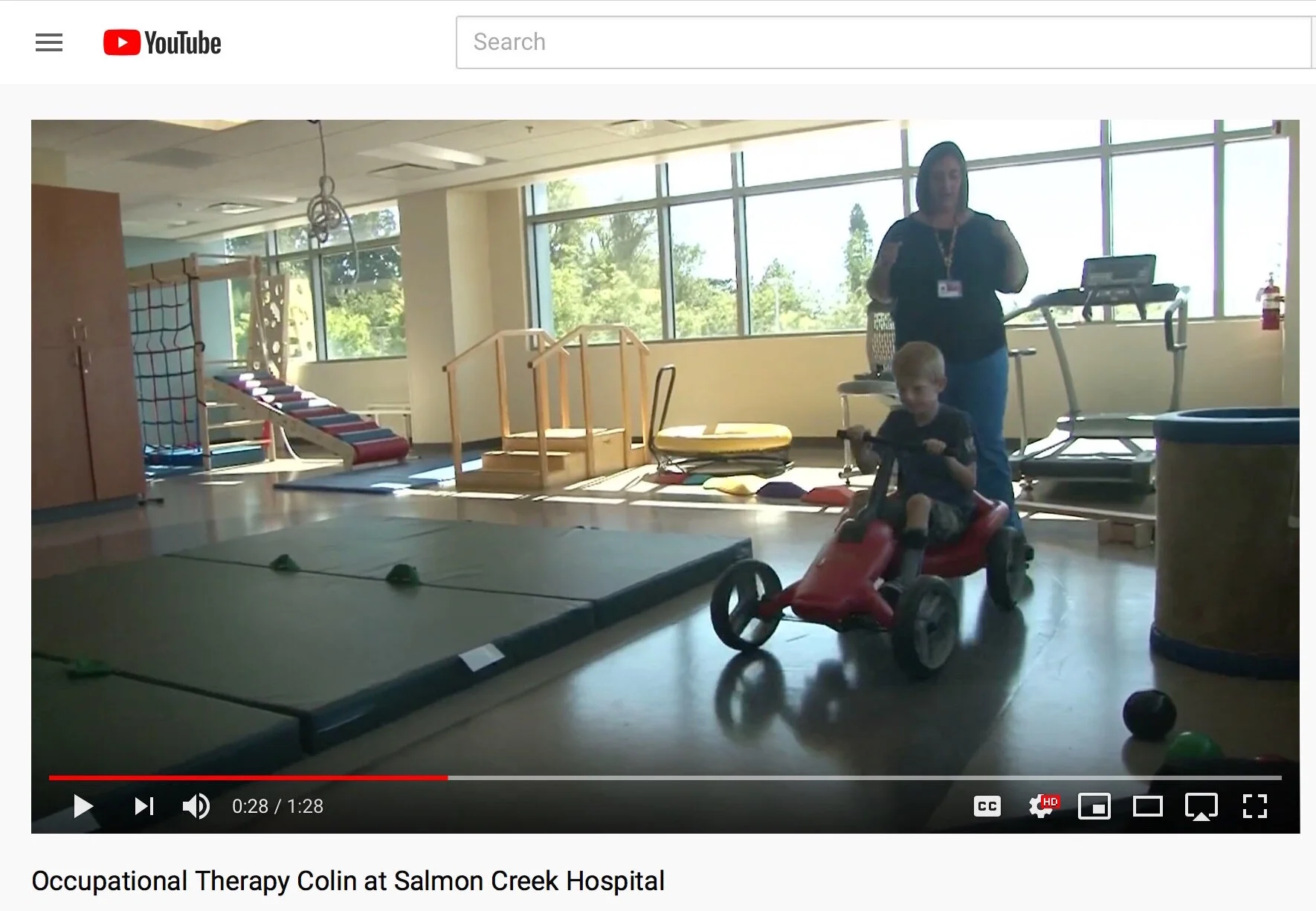MEDICAL PROFESSIONALS
The Pumper Car® ride-on vehicle is a therapy device designed for children. Its unique pump action creates a healthful, vigorous activity that activates muscle groups in the upper and lower body simultaneously, while creating a smooth, highly engaging and fun ride.
It’s also many pediatricians’ and therapists’ secret weapon to have their patients come to therapy and work hard. Some therapists even save it as a reward for their patients to do other exercises. At Legacy Salmon Creek in Vancouver, Washington they’ve even developed a special indoor track designed for their mini fleet of Pumper Car® ride-on vehicles.
Below is information to help you learn how your patients could benefit from the Pumper Car® ride-on vehicle:
• approval to use the HCPCS code A9300 on any prescription for this medical mobility device.
• the FDA’s designation of the Pumper Car as a non-measuring exercise device for medical purposes.
• a published Independent Review Board (IRB) study,
• a compelling video of a therapy session using the Pumper Car® ride-on vehicle,
• a list of conditions and diagnoses the Pumper Car® ride-on vehicle has been used to help, and
• some testimonials from your colleagues around the country.
The Pumper Car® Ride-on Vehicle Now Has a HCPCS Code
In October 2020, the Columbia-Inland’s Pumper Car® ride-on vehicle was granted the usage of the HCPCS Code A9300. This means that patients who receive a physician’s prescription for a Pumper Car® ride-on vehicle may have some or all of the cost covered by Medicare, Medicaid or private insurance. To assist patients, we’ve made sure that the Pumper Car® ride-on vehicle is listed on the PDAC system for insurance verification.
This therapeutic tool is also designated by the U.S. Food and Drug Administration (FDA) as non-measuring exercise device intended for medical purposes. With use of the Pumper Car® ride-on vehicle, children may be able to improve their equilibrium and strength of their upper and lower torso. As such, this device could be especially useful for children with special needs, such as Down syndrome, autism, spina bifida, cerebral palsy, muscular dystrophy, brain injury, pain disorders, generalized weaknesses and child obesity.
The Indications for Use (IFU) of the Pumper Car® ride-on vehicle, registration number 3014895737, is a four wheeled, low-center of gravity, non-measuring exercise device intended for medical purposes. It helps to redevelop muscles or restore motion to joints for patients who have an aversion to physical exercise. This device has been of special interest to hospitals and clinics that serve children with special needs.
Independent Review Board Study
Researchers at the University of Michigan, Janet L. Hauck, Ph.D. and Dale A. Ulrich, Ph.D. conducted an independent study and proved the Pumper Car® ride-on vehicle was useful for all children, including those with special needs. Their results were published in the Research Quarterly for Exercise and Sport. Click the button below to read the article titled, Acute Effects of a Therapeutic Mobility Device on Physical Activity and Heart Rate in Children With Down Syndrome.
Madeline
We were allowed to sit in on one of Madeline’s therapy sessions. She has cerebral palsy that affects all four limbs. As a result, she cannot walk unassisted and her ability to get around on her own has been limited to a power wheelchair. Madeline has had physical therapy, with reasonable progress, at hospitals most of her life. But she’s making great strides now in strength, coordination and balance. Her therapist attributes this in large part to the Pumper Car® ride-on vehicle because therapy has become enjoyable rather than an arduous task. Madeline frequently exclaimed during her session on the Pumper Car® ride-on vehicle, “This is fun!”
Cindy Miles PT, PHD, PCS
Academy of Pediatric Physical Therapy President
During the 2016 SoPAC Conference, we caught up with the organization’s president, Cindy Miles. She teaches several courses on torticollis and plagiocephaly around the country where she introduces various techniques of working with children. One of the things she has them do is ride the Pumper Car® ride-on vehicle. She’s been using it for over 17 years now and finds it’s a great adjunct to her practice because it allows the children to exercise their upper and lower extremities. Cindy told us, “I like that the children have to work to keep their feet on it. This becomes a great activity for bilateral coordination and reciprocation as well. It is great for strength, coordination and just a great way to have fun!”
Sebastian
This personable six-year-old has spina bifida. He arrived at one of our Demo Days in a wheelchair. However, once he was on this Pumper Car® ride-on vehicle, he took off around the track—laughing and challenging his buddy to a race.
Another story of a little boy with spina bifida is Angel from North Central Illinois. He has significant mobility problems and delays in gross motor development. Angel requires using a wheelchair and can’t stand without braces. He also suffers from reduced upper body range of motion, strength and coordination. Angel is enrolled in a public school but his condition often isolates him from the other children, causing him to be withdrawn. After his mother obtained a Pumper Car® ride-on vehicle through a non-profit foundation’s support, Angel became significantly more active. He now is able to use his legs to propel the Pumper Car® ride-on vehicle which gives him increased leg strength, Equally as important, Angel now feels more included with his peers and is less withdrawn. With his increased mobility, he has become more sociable and confident. His improved ability to use his arms and legs has, in turn, increased hope in his ability to learn to walk.
If you have a patient like Angel, who might be able to benefit from similar support, contact the Wheel to Walk Foundation to see if he or she would qualify for a Pumper Car® ride-on vehicle.
The Pumper Car® ride-on vehicles help therapists across the country because it’s a safe and effective device that improves the health and quality of life for children with special needs such as:
18 CONDITIONS & DIAGNOSES
ADHD
Asperger’s
Ataxia
Autism
Brachial plexus injuries
Brain injuries
Cerebral palsy
Childhood obesity
Down syndrome
General weakness
Hemiplegia
Muscular dystrophy
Poor regulation of activity level
Poor sensory awareness
Sensory integration dysfunction
Spina bifida
Torticollis
Type 2 diabetes
Occupational therapists, physical therapists and a speech pathologist at Legacy Emanuel Children's Hospital in Portland, Oregon share their experiences about the benefits of using the Pumper Car® ride-on vehicle.
18 THERAPEUTIC BENEFITS
Age appropriate play skills
Bilateral coordination
Directionality
Extremity development
Increased endurance
Motor coordination
Muscle tone
Posture stability
Praxis or motor planning
Proprioceptive processing
Regulation of activity
Self-esteem
Self-confidence
Social skills development
Spatial awareness
Speech
Vestibular processing
Visual skills
Colin is an outpatient at Legacy Salmon Creek Medical Center in Vancouver, Washington. As he rides around the therapy department, his therapist talks about the various goals he is working on including arm and leg strength, knee extension and range of motion.
TESTIMONIALS
“I would describe the merits of the Pumper Car as an effective tool in the rehabilitation of children with special needs including autism to spina bifida to cerebral palsy...The unique design provides movement that strengthens both upper and lower extremities...The Pumper Car has been utilized at many respected institutions including the Kennedy Krieger Institute at Johns Hopkins, Duke Children’s Hospital and others to back up these claims. ”
“The Pumper Car is a popular and motivating device for children to use. Among other propelled equipment offered, patients most often pick the Pumper Car.”
“We use the Pumper Car primarily when therapy goals included increasing upper/lower extremeity strength and core strength...It is used frequently and withstands institutional abuse well, with no needs for repairs or maintenance...The Pumper Car has certainly been helpful for us!”
“The Pumper Car is used extensively in our clinic with patients with various types of physical and neurological conditions…Safety is the paramount consideration in any treatment method in our clinic. I am confident in saying that the Pumper Car is an extremely safe piece of equipment, which it achieves through its fluid and ergonomic operation. It engages the whole body while eliminating stressful impacts on joints, bones and muscle groups. ”
“The Pumper Car is especially appropriate for use by children with deconditioning following illness, decreased strength, low tone, motor planning issues, lack of coordination, autism, sensory processing disorders and childhood obesity...It provides benefits that other equipment does not, such as stability for children who experience postural instability, a rhythmic timing pattern and an aerobic workout.”
“The Pumper Car has become one of our favorite therapeutic tools in our inpatient and outpatient programs...It is a movement mobility tool that the occupational therapists use to address many therapy goals...Children are experiencing movement when using the Pumper Car and movement leads to learning about space and directionality...The Pumper Car can be used with most children with varying diagnoses that effect muscle strength, coordination, endurance, motor planning, visual and sensory motor concerns.”




